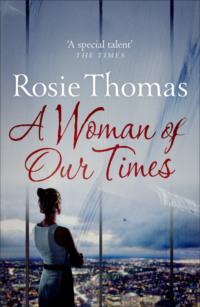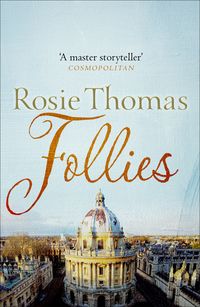
Полная версия
If My Father Loved Me
Anthony Phebus was Ted’s earliest mentor in the perfume business. Ted always called him the Old Man. Ted had started working for him not long after I was born, as a bookkeeper and general office administrator, although of course he didn’t actually have any bookkeeping skills or relevant office experience. In the years after the war he did a variety of jobs, from van-driving to working as a garage hand, but when I was born he decided that it was time to move up in the world. He applied for the job with Mr Phebus and impressed the old man so much with his apparent expertise with figures that he was offered the position on the spot. I knew this part of the story well, because Ted liked to tell it with a wink.
‘I learned on the job.’ He smiled. ‘Always the best way. You don’t know what you’re going to be able to do until you have to do it, and when you have to it’s surprising what you can do.’
In any case, Ted Thompson didn’t stay long with the ledgers and file cabinets in the outer office. Anthony Phebus’s business was as a commercial fragrance supplier. If a perfume house wanted to design a new scent, or if a manufacturer of face powder or shampoo needed a fragrance to set off a new product, they commissioned Mr Phebus to develop one for them. In his laboratory, with a tiny staff and minimal investment, the old man would mix and sniff and frown and adjust and finally come up with a formula that he would sell to the manufacturer. Sometimes he made up the perfume oil itself, juggling with money and loans to buy in enough raw materials just as he played with the balance of ingredients in his latest creation. Cosmetics manufacturers knew that he would give them what they wanted. Quite soon after joining the company Ted was helping him to do it. Phebus Fragrances was a long way down the scale from Chanel or Guerlain, but the old man did enough business to survive.
When we arrived Mr Phebus was at his desk in an untidy cubbyhole of an office, but he stood up straight away and came round to shake my hand. I was frightened of his eyebrows. They were white and jutted straight out from his forehead like a pair of bristly hearth brushes.
‘And so, Miss Sadie, you work hard and make my fortune for me today?’
I looked up at Ted for confirmation and he gave me a wink, followed by his wide smile.
The ‘lab,’ as Mr Phebus and Ted always referred to it, was a windowless room lined from floor to ceiling with ex-WD metal shelves. On the shelves, drawn up in precise rows, were hundreds and hundreds of brown glass screw-top bottles. Each bottle was labelled or numbered in the old man’s neat, foreign-looking script. In the centre of the room was a plain wood table with another clutch of bottles ranged on it in a semicircle, a line of notepads and pens, a pair of scales and some jars of what looked to me like flat white pencils. There was a sink with a dripping tap and some bright overhead lights.
‘This is where we make our magic, eh?’ Mr Phebus laughed. ‘Where your good father learns to make dreams for beautiful women.’
I didn’t like the reference to beautiful women or their dreams, not in relation to my father. The only women he should have anything to do with were Mum and me. I kept my mouth shut in a firm line and waited.
‘Sit down here, miss,’ Mr Phebus said and I slid into a seat. As well as having alarming eyebrows, I thought he talked in a funny way, as though ‘s’s and ‘th’s were ‘z’s. When I was older I learned that the old man had been an analytic chemist in Warsaw, but he had come to London with his wife before the war. He started work with a cosmetics house and he turned himself from a chemist into a perfumer by sheer hard work.
‘Your father, Mr Ted here, he has what we call a nose,’ Mr Phebus grandly announced.
I remember looking at my father’s face and realising it was a handsome one compared with Mr Phebus’s, and feeling proud of my father’s youth and good looks. But his nose seemed relatively unremarkable. ‘So have I,’ I retorted, pressing the end of mine and squashing it.
‘We shall see,’ the old man said. I thought he was not very observant if he couldn’t see it already.
The three of us sat down at the plain wood table and Ted gave me my own jar of the flat white pencils. Now I could see that they were in fact strips of thick blotting paper, the same size as the spills my mother used for lighting the gas. Mr Phebus was humming and setting a line of the little glass bottles between us. He unscrewed the top of one with a flourish and told me to take my blotter. I glanced at Ted and he pointed to the white paper strip. Mr Phebus already had one and as I watched he slid the tip of it gently into the liquid in the bottle.
‘Now you,’ he said. I copied him exactly as he lifted the blotter to his nose and breathed in. His eyebrows twitched and I looked again at Ted, wanting to laugh. My father pressed his forefinger against one nostril and winked again. I sniffed hard at my dipper, as Mr Phebus had done. A dense, sweet cloud instantly filled my nose and rushed up through the secret insides of my face until it seemed to squeeze its fingers round my brain. I coughed and closed my eyes, and as I let my hand fall the scent’s power receded, although I could still feel the pressure of it above my cheeks and the stinging shock in the tender membranes of my nose.
‘What is that?’ I whispered.
Mr Phebus said, ‘That is lavender. It will be one of the top notes of the scent we are working on today.’
‘Lavender’s blue, dilly dilly.’ I had heard the song on Listen with Mother and I was pleased to make this unexpected connection. But Mr Phebus held up his hand and frowned. We were working. The lab was no place for rhymes or any kind of inattention. He unscrewed another bottle and we went through the same process, dipping and smelling. This one was nasty as well as strong. The stink was sharp, like cats or the brown-tiled lavatories at my school, and I screwed up my face in disgust.
‘Cassia,’ Mr Phebus said. ‘Very important. You must remember that not all perfume essences smell sweet and pretty. We often use these sensual animal stinks like musk and civet for our base notes, to anchor the structure. Men and women are animals too, you know, and we all respond in the same way.’
I frowned at him, battling my incomprehension.
The door opened and a woman with her hair swept up on the top of her head looked in at us. ‘Phone call for Mr Thompson,’ she said.
I shivered on my wooden seat with pleasure at the importance of this. We didn’t have a telephone at home. Ted sprang up and went out, not remembering to look round at me. Mr Phebus went on unscrewing bottles and motioning to me to dip and sniff. Some of the smells were like flowers pressed and squeezed to make them powerful instead of sweet and gentle, others were surprising, reminding me of orange peel, or Christmas, or the sea at Whitstable where we had spent a summer holiday. By the time my father came back there were ten used white dippers on the table in front of me. I was beginning to feel bored and slightly queasy.
‘Now, miss,’ Mr Phebus said, pulling at the thistly tuft of one eyebrow. ‘Pay no attention to your father. Can you remember which one was lavender?’
Ten dippers with their tips discoloured or turned translucent by the oils now lay on the table in front of me. I stared at what was left of the evidence and then reluctantly I picked up several in turn and sniffed at them again. My head felt muzzy and too full of potent fumes. The dippers smelled less strongly now; their separate characters and the names Mr Phebus had given them had become hopelessly confused. I took a wild guess. ‘That one?’
‘No, that one is jasmine.’
Ted laughed and sat down again on the wooden chair beside mine. He tilted it back on two legs with his arms folded, in the exact way my mother told me not to do at home. My eyes were stinging. I felt that I had let him down.
‘Don’t worry, you can learn the difference if you try hard enough,’ Mr Phebus said. ‘I managed it. I spent many years of hard work, memorising thousands of notes, which is what we call the different basic scents and that is only the very beginning of what a perfumer must know. He must have other skills too, and most of all he must have imagination that lifts him from being a mere technician into an artist of fragrance.
‘I am an artist, in my small way, but only of the fourth or maybe third degree. But your father here’ – he paused for effect, with his eyebrows pointing at me – ‘he is, at once, a natural. He smells a note only once and he remembers it. And he knows, because the artistry is in his heart and in his mind, he knows what he will add and what he will withhold to coax from these bottles, these not romantic little jars, the dreams of women.’
Women and their dreams, again. I was torn between pride in my father and a new discomfort that rubbed at the margins of my understanding. I didn’t like the feeling of insecurity that came with it.
‘Of course, he still has very much to learn. Many years of practice.’
Ted laughed out loud delightedly. ‘Better get on with it, then.’ He was always enthusiastic in those days. He rubbed his hands and smacked his lips, full of raw appetite for life. I didn’t recognise his hunger then for what it was, but I already knew that my mother entirely lacked what Ted possessed. I loved her, of course, and I took for granted her devotion to me, but she wasn’t thrilling in the way my father was. She was always there and I never noticed her constancy until she wasn’t any longer. One morning she was at home and that same afternoon she was never coming back. That’s how sudden her death was from the brain haemorrhage. Afterwards, when I thought about her, I would remember her quietness and restraint. She used to brush my hair and tie ribbons in it, looking down or away instead of into our joint reflections in the mirror of her kidney-shaped dressing table. She wore plain jerseys and calf-length colourless skirts that hid her pretty legs. It was as if even before she left us altogether she occupied only the corners of her own life. Whereas Ted joyfully overflowed out of his, and ran in a hot current through hers and mine as well.
Mr Phebus said, ‘Let’s have Black Opal three and four, then.’
Ted brought some bottles from the shelves and they drew their notepads and jars of blotters towards them. The two of them began nosing and muttering together, and I half listened while unfamiliar words washed over my head. They talked about heart and base notes and aldehydes and sparkle and synthesis, and the names of natural essences and the chemical polysyllables of synthetics rolled off their tongues. I didn’t remember tongue-twisting phenylethylene or galaxolide, but the mysterious-sounding beauty of naturals – vetiver and musk and mimosa – did stay with me.
They were still with me now as I sat by my father’s bed and held his dry hand. Only the names, not the scents. I failed Mr Phebus’s first test and I knew I was not an artist like Ted.
I was talking too much, I realised. It would be tiring for him. ‘Do you remember?’
‘How old were you?’ he asked, restlessly moving his legs and frowning with the effort of recollection.
‘Six, or seven.’
‘Back in ’56, then.’
I was pleased that he knew the year of my birth. I wouldn’t have placed a bet on it. ‘Yes.’
‘We were working on contract for Coty.’ His hand moved a little in my grasp, as if he were trying to reach for something, and then fell back again. ‘I don’t remember the day. It must have been boring for you.’
We’re so polite to each other, I thought. We are like a rough sea swirling under a thin skin of ice.
While the old man and my father continued with their sniffing and scribbling I began to fidget and rock on my chair. I made a wigwam of dippers and then, with a hasty movement to stop it collapsing, I knocked over a bottle. The bottle rolled across the table and stopped in front of Ted.
He raised his head, his forehead corrugated with irritation and his eyes cold. It was a look I had seen often enough. ‘Why don’t you go out and sit by Miss Mathers?’
Miss Mathers was the woman with piled-up hair. I had seen them laughing together and heard Ted call her Babs, but I understood that she was Miss Mathers to me. I stood up obediently.
Miss Mathers gave me some pencils and some sheets of paper to draw on, then went back to her typing. She rolled letterheads and pale-pink and green flimsies sandwiched with carbon paper into her black-and-gold typewriter and busily stabbed the keys. Once or twice she answered the telephone in a sing-song voice: ‘Phebus Fraygrances.’
At twelve thirty Ted and I went out. After the dimness inside the warehouse the sunshine was so bright it made me blink. We strolled down Kingsland Road to a pub and I sat on a bench in the sun whileTed went inside. My excitement flooded back with the novelty of all this and I swung my legs so my white socks flashed. Ted brought out lemonade and a cheese sandwich for me, and a pint of beer and a ham-and-pickle sandwich for him. He took a long swallow of the beer and rubbed the froth from his clipped moustache. Then he slid a packet of Players from his pocket and lit one. He blew out the smoke in a long plume and sighed with pleasure. ‘Not a word to a soul,’ he said to me, pressing his lips with the side of his index finger. ‘No good for the old nose, booze and fags, are they?’
I was awed to be part of this conspiracy. The old man and Miss Mathers would have had to torture me before I would have breathed a word about my father’s lunchtime habits.
The afternoon of that day was the same, except that the hours seemed longer than the morning’s. My father and the old man were shut up in the lab together and Miss Mathers largely ignored me. I drew some desultory pictures on my sheets of paper and looked at shiny brochures with pictures of women and tins of talcum powder in them. Yet as Ted and I finally rode home in the bus, along Holloway Road and up to the Archway, I felt utterly triumphant. The new words I had learned still rang in my head: mimosa, musk, amber. Mr Phebus had given me a folded ten-shilling note when Ted took me into his office to say goodbye. But the best of it was the new footing I felt that I was on with Ted himself.
Before now, he had gone out in the mornings and come back again at night with the newspaper, a kiss for my mother and a joke for me. He brought different sounds and smells and a new atmosphere into the house with him, but I had no picture in my mind of where he had been. Quite often he was away at night too, or for days at a stretch, on business for Mr Phebus.
But after today, I felt that I was a part of his other world. There had been beer on his breath as we walked back to the warehouse after the pub, and he had put pennies into a chewing gum machine on a wall. We were both chewing one of the little white pillows as we walked diagonally across the bomb-site to the warehouse door. I had heard him joking with Miss Mathers, although I didn’t like the soft teasing sound that crept into his voice when he spoke to her. At Miss Mathers’s suggestion, I had carried their pot of tea into the lab at four o’clock. Ted and Mr Phebus were both in their shirtsleeves with scratched notes and discarded dippers spread everywhere, and I understood that they were too preoccupied to glance at me. I accepted my lack of importance with proper humility.
The impression of that day stayed with me for years. It defined my notion of work, as the utterly exotic somehow hemmed in by the tedious progress of hours. At the end of it, as Ted and I marched up the garden path to the house where my mother was waiting for us, I kept my thrilling new awareness locked inside me.
My father was an artist of the first degree. He was a nose.
The house that night seemed colourless and smaller and overfamiliar and my mother even quieter than usual. ‘What did you do?’ she asked, as she brushed my hair. The sheets on my bed were smoothed down and I knew without looking that my hot-water bottle with the rabbit cover was in its proper place.
‘Drew some pictures,’ I answered evasively. I didn’t want to share the experience, even with her.
‘That’s nice.’
I didn’t ask about her day’s absence. Maybe she had been to see the doctor about her headaches. Sometimes they made her eyes red and swollen so she had to lie down on the double bed, a small shape hunched up on the green candlewick cover with her back turned to the door.
‘It wasn’t boring,’ I told Ted now. ‘I loved it.’
‘He was a good perfumer, the old man, a craftsman. I learned everything I needed to know from him. No business sense, though. None at all.’
I had to lean closer to catch his words. His voice seemed to be fading to an echo of itself and his eyes were gradually falling shut. I thought he might be drifting into sleep and I had to stop myself from grasping his hand and shaking it hard to keep him with me. I watched the shallow rise and fall of his chest under his pyjama jacket.
Then his eyes snapped open again and he struggled to sit upright. ‘It stinks in here,’ he complained. His nostrils flared and deep lines pulled the corners of his mouth downwards. I sniffed the air and caught a whiff of vomit and a faint fecal undertone. If even I could smell it, the ward must indeed stink to Ted’s sensitive nose.
I sandwiched his hand between my two. ‘We need something stronger to block it out. I’ve got an idea. Shall I go out and buy some perfume to spray round?’ I could hear the cheeriness in my voice cracking and shivering like the sea ice, with grief welling up from beneath. ‘What would you like? Joy? Vent Vert? Or one of your own? How about Black Opal or Iridescent?’
‘I’ve smelled enough perfume for one lifetime,’ Ted said irritably.
I bent my head and waited. And then, when I finally stole a glance at his face, I saw that this time he really had fallen asleep.
I went down to the hospital visitors’ car park, where I could use my mobile phone, and called Lola to relay the news.
‘Oh God, Mum, I’m sorry. Poor Grandad. I’d better ring in and cancel my shift,’ she said at once. Lola worked in a bar during university holidays. At least she’s at home, I told myself, not up in Manchester as she was all term-time. We agreed that she would collect Jack from school in her car and they would come straight up to the hospital.
‘Drive carefully,’ I warned her. ‘Of course I will.’
Next I telephoned Penny at the Works, as we call the book bindery and small print shop we jointly own. Penny and I have been business partners for twelve years. I have always loved the physical weight and dimensions of fine books, the texture of paper, and the variety and intricate grace of typefaces, and Penny possesses the rare combination of design flair and business acuity. We work well together and although there are no great riches in what we do, we make an adequate living out of our leather bindings and hand-set printing.
‘Don’t worry,’ Penny told me. ‘Don’t even think about anything here, I’ll handle it. And I’m here if you need me, okay?’
Next I spoke to Caz. Caz has been my friend since we lived in adjacent rooms in a decrepit student house thirty years ago. We were married in the same year, and she and Graham had their two boys in quick succession, not long after Tony and I had Lola. We have shared the quotidian details of our lives ever since, to the extent that if I think of myself as having an extended family, Caz and Graham and their children are it.
‘What can I do?’ Caz said, as soon as I told her the news. If there is ever a favour to be done for someone else, an empty slot in a rota or a spare pair of hands required, Caz is always the first to volunteer.
‘Will you have Jack, if I have to stay over at the hospital? If Lola can’t hold the fort, that is?’
Jack didn’t currently get on all that well with Dan and Matthew, Caz’s boys, but in this emergency he would have to make the best of it.
‘Of course,’ she assured me. ‘Anything else? What about some shopping? Or listen, I’ve got a chicken, I can roast it and bring it over …’
Caz and I both use food as shorthand for love. With Mel and me it’s more a matter of romance and theatre.
Caz was saying, ‘It’s very sudden. He wasn’t ill before, was he?’
‘Yes,’ I agreed. ‘It is very sudden.’ I don’t think that even Caz, whom I have known for all these years, has ever really noticed how little I actually talk about my father or about the past.
‘I’ll be thinking of you, darling,’ she said in her warm voice. ‘Call me as soon as there’s any news.’
Finally I dialled Mel’s office direct line. After I had told her what had happened she said, ‘That’s quite strange, isn’t it? The way we were talking about him last night?’
‘Yes.’
‘Do you want me to come up and keep you company?’ It was a generous offer. Mel worked for a big headhunting company and I could guess at the rapid mental diary reshuffling she must be doing, although there wasn’t the faintest hint of it in her tone.
‘No. But thank you.’
‘Sadie?’
‘Yes?’
‘You can’t change or even affect what’s going to happen, you know. You just have to accept this, for him and for yourself.’
Mel understood me well and my need to control what went on around me. She knew that it was disturbing for me to feel powerless, as I did most of the time where Jack was concerned, although she didn’t know what had made me this way.
‘I know,’ I murmured.
After she had rung off I sat down on the low wall of the car park. The morning was grey under a monochrome sky, with none of the luminous quality of the evening before. Cars rolled through the entrance and circled past me, looking for slots. A young man in a Peugeot skidded into an empty place and leaped out, clicking the remote locking as he sprinted towards the hospital doors. His wife must be in labour, I thought. I watched an old couple extricate themselves with difficulty from their Honda. The wife took a pair of sticks from behind the passenger seat and gave them to her husband, waiting with exaggerated patience while he shuffled himself into the ‘go’ position. They set off on the journey towards the doors together, without having exchanged a word. A big Asian family filed past, followed by a white girl who looked younger than Lola pushing a baby in a buggy. All these people had their different reasons for coming here, to this place of crisis, and all of them brought with them the weight of their anxiety or the bubble of hope. Ted was dying, but so were other people behind the stained concrete façade, and at the same time others were struggling with pain or dreaming of recovery, and babies were fighting their way out into the light. Being part of this random community made me feel less isolated and the walls that contained my feelings seemed to grow thinner, as if they might rupture and I might be able to give way to grief.
A florist’s van drew up and the driver began unloading cellophane-wrapped bunches of flowers finished with puffs of gaudy ribbon. The last item to appear was a wicker basket with a huge hoop handle and a ruff of paper enclosing a mass of pink and white carnations. The sight made me smile and remember the day Lola was born. She was handed to me wrapped in a blanket, and I looked down into her fathomless black eyes and felt a stirring of love I had never known before.
Ted was living at that time with an auntie called Elaine. It was Elaine who sent flowers and a card (‘It’s a Beautiful Baby Girl!’) signed in both their names, with a line that read, ‘Your Dad’s up to his eyes, nothing new!’
When the driver came back from delivering the flowers he leaned against the back doors of the van and lit a cigarette. He saw me watching him and called out, ‘Just taking five, eh?’
‘Why not?’ I called back meaninglessly.
But suddenly the sky seemed to lighten and the diesel-heavy air of the car park softened and sighed in my ears. I could feel the gritty surface of the wall under my fingertips and hear the swish of traffic out on the dual carriageway. The stitching on the leather strap of my handbag was coming undone and I stared down at the tiny frayed ends of thread and the puckered edges of the stitch punctures. Real time and place blurred and swam almost out of my reach. It was one of those rare moments of extreme physical and mental awareness, when even the smallest incident seems to contain infinite richness and a profound meaning that only narrowly evades capture. I was wide awake, but I felt the altered dimensions of a dream world beckoning me. I swung my feet up on to the wall and rested my head on my bent knees. Behind my eyelids, in this quietness, I could talk to Ted and he to me. The dialogue had always been running back and forth between us, in this other place, the old skeins of angry words and bitter words tangled with the words of love and faith, which were the ones I wanted to hear and speak now.









